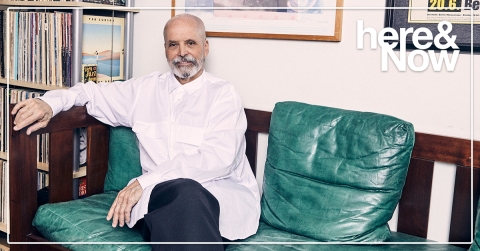Today's most e-mailed story from the nytimes.com Movies section is "Demon Barber, Meat Pies and All, Sings on Screen," which was featured in yesterday's New York Times. The article tracks the story behind the film version of Sweeney Todd starring Johnny Depp—the soundtrack is due out on Nonesuch December 18—from the first time director Tim Burton saw the Stephen Sondheim musical as a college student in 1980. "After stewing in his imagination on and off for some 25 years," writes Sylviane Gold, "that encounter has been channeled into Mr. Burton's new film version."
Today's most e-mailed story from the nytimes.com Movies section is "Demon Barber, Meat Pies and All, Sings on Screen," which was featured in yesterday's New York Times. The article tracks the story behind the film version of Sweeney Todd starring Johnny Depp—the soundtrack is due out on Nonesuch December 18—from the first time director Tim Burton saw the Stephen Sondheim musical as a college student in 1980. "After stewing in his imagination on and off for some 25 years," writes Sylviane Gold, "that encounter has been channeled into Mr. Burton's new film version."
Burton got the OK from Sondheim to make a film adaptation of his play years ago, but other projects kept him from realizing his goal until now. When he was ready to make the film, and Depp signed on to play the title role, he knew there was no doubt the actor would succeed: "If he didn't think he could do it, he would have said no," Burton says.
In the article, Depp admits to having shied away from singing during his younger days in a band, because "singers always got too much attention. I was always happier playing my guitar in the dark." When the time did come for him to prepare vocally for Sweeney, he avoided formal training with a coach, because he already knew how his take on the role should sound: "He needed to be, for lack of a better word, slightly more punk rock."
With a Sweeney in place, Sondheim set to adapting his work for the screen. The film's music producer, Mike Higham, worked both with the composer to make some cuts to the score—"On film, you want to keep things moving," Sondheim says—and with the composer's longtime orchestrator, Jonathan Tunick, to beef it up, "to get the big cinematic sound Tim was after," Higham tells the Times. This was in keeping with Burton's larger directive to Higham for the film: "I want the music almost not to stop."
To read the article, visit nytimes.com.
Also in Sunday's Times was an article on the surprising number of blood-themed films due in theaters this holiday season, including Sweeney and There Will Be Blood (Nonesuch will release its score by Jonny Greenwood as well on December 18). To read that article, click here.



